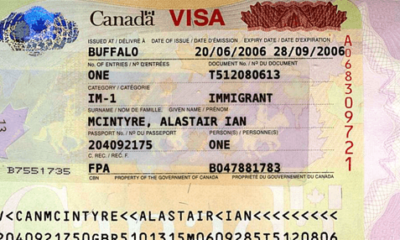Oppotunities
IRCC’s scrutiny: How Canadian immigration verifies real spousal relationships

The Immigration, Refugees, and Citizenship Canada (IRCC) places great emphasis on family reunification in Canadian immigration. When applying to sponsor a spouse or partner for Canadian immigration, IRCC requires assurance that the relationship is genuine.
This scrutiny is necessary because there are instances where foreign nationals attempt to establish non-genuine relationships with Canadian citizens or permanent residents to attain Canadian permanent resident status, while the sponsor believes it’s a genuine and committed partnership. This situation can be emotionally and financially taxing for the sponsor, as they commit to financially supporting their partner for three years after receiving permanent resident status, regardless of the relationship’s status.
Furthermore, there have been cases where Canadians or permanent residents engage in business-like arrangements and simulate relationships with foreign nationals in exchange for compensation.
To validate the authenticity of a relationship, specific documents must accompany an application to sponsor a spouse or partner. If an immigration officer requires additional proof of the relationship’s authenticity, they may request an interview at an IRCC office with both the sponsor and the applicant, separately. If the officer remains unconvinced of the genuine nature of the relationship, the foreign national may not qualify for sponsorship.
Proving a Genuine Relationship
IRCC requests all couples, including same-sex couples, to provide documentation supporting the authenticity of their relationship. The required documentation varies based on whether the couple is married or in a common-law relationship in Canada.
Married Couples:
For a married couple, several official documents are necessary, including:
- A completed Relationship Information and Sponsorship Evaluation questionnaire (IMM 5532) (included in the application package).
- A marriage certificate.
- Proof of marriage registration with a government authority.
- Proof of divorce if either the applicant or spouse was previously married.
- If the couple has common children, long-form birth certificates or adoption records listing both parents.
- Wedding invitations and photos.
Common-Law Couples:
In Canada, a common-law relationship is defined as an unmarried couple living together in a conjugal partnership for at least one year. They must submit the same documentation as married couples (minus wedding photos and invitations) and:
- Documentary evidence of financial support or shared expenses.
- Proof of the relationship’s recognition by friends and family (e.g., letters, social medical information).
Both married and common-law couples must provide items from at least two of the following document sets:
- Proof of joint residential property ownership.
- Rental agreement showing both as occupants.
- Joint utility accounts (e.g., electricity, gas, telephone, internet), joint credit card accounts, or joint bank accounts.
- Vehicle insurance indicating both as residents.
- Government-issued documents for both parties showing the same address (e.g., driver’s licenses).
- Other documents with the same address, whether held jointly or not (e.g., cell phone bills, pay stubs, tax forms, bank or credit card statements, insurance policies).
Couples unable to provide at least two of these documents must provide a detailed written explanation.
Proving Cohabitation:
Couples can demonstrate they’ve been living together as conjugal partners in Canada through various means, including:
- Joint bank accounts or credit cards.
- Joint residential property ownership.
- Joint residential leases.
- Joint rental receipts.
- Joint utility accounts (electricity, gas, telephone).
- Shared management of household expenses.
- Evidence of joint purchases, especially for household items.
- Correspondence addressed to both parties at the same address.
- Shared responsibility for household chores.
- Records of telephone calls.


















